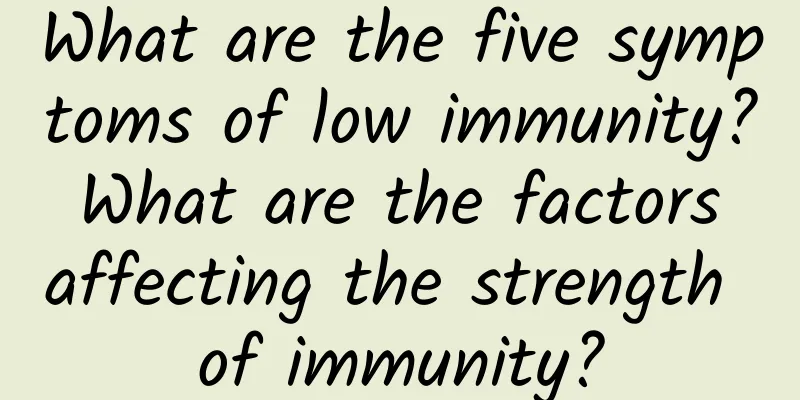What are the five symptoms of low immunity? What are the factors affecting the strength of immunity?

|
Author: Fan Yunzhu, attending physician of Jiahui Medical Reviewer: Zhang Yu, researcher at Chinese Center for Disease Control and Prevention, doctor of medicine gossip Recently, a group of 5 symptoms of low immunity became a hot search on Weibo, and major new media accounts forwarded them as if they had found a treasure. In summary, these symptoms include: 1. Urine or breath smells like rotten apples 2. Frequent nosebleeds and pale complexion 3. Frequent colds and fevers 4. Myositis and dermatomyositis 5. Ground glass nodules in the lungs Image source: Weibo screenshot Is this really a sign of immunosuppression? analyze Let me give you the answer first: these are common physiological or disease symptoms and have nothing to do with immunodeficiency. For example, breath that smells like rotten apples is often related to oral hygiene, oral or gum inflammation; urine that smells like rotten apples is also commonly caused by dietary or drug influences, low water intake, and urinary tract infections. In rare cases, rotten apple smell combined with other symptoms may point to ketonuria. People with this disease have a weakened immune system. In this case, the disease is the "cause" of the rotten apple smell and the weakened immune system, and the rotten apple smell and the weakened immune system are the "manifestations (results)" of the disease. By the same token, nosebleeds, pale complexion, recurrent colds, myositis, and dermatomyositis are physiological or disease manifestations and have nothing to do with immunodeficiency. What is immunity? Speaking of low immunity, let us first understand what immunity is. There are a large number of exogenous stimuli in the environment where humans live: mainly microorganisms (viruses, bacteria, fungi, protozoa and multicellular parasites), as well as proteins, chemicals, and even drugs. When these stimuli (medically known as antigens) invade the human body, the body will produce an immune response to them through immune molecules such as antibodies and cytokines and immune cells such as lymphocytes and giant cells, resulting in the effective removal of antigens from the body to ensure its own stability. The tissues, organs, cells and molecules that perform these immune functions together constitute the immune system - which has three main functions: resisting invasion, maintaining body stability and monitoring and eliminating cell mutations. Immunity refers to the function of the immune system, mainly the ability to resist invasion by foreign microorganisms, proteins, chemicals, etc. In daily life, people often call the immune system's ability to resist disease "immunity." Immunity is usually divided into two types: one is innate, called natural immunity, also known as innate immunity, which is the first line of defense against the invasion of pathogenic microorganisms. From the outside to the inside, it includes skin, mucous membranes, tissue barriers, secretions and phagocytes, etc. Image source: Medical Immunology textbook The other is acquired immunity, also known as adaptive immunity. It is the body's ability to recognize and eliminate specific pathogens during long-term contact with pathogens. It is mainly composed of lymphocytes and their products, including the antibodies we are familiar with. What is immunodeficiency? In medicine, there is a group of diseases called "immunodeficiency", which means that the body's immune system malfunctions. It includes a variety of congenital and acquired immune dysfunctions, with fixed diagnostic criteria and clinical manifestations. "Immunocompromised" is not a disease. It refers to a state of the body where the immune system is weakened. It is affected by many factors, including age, disease, medical measures and drugs. Unlike diseases, low immunity does not have typical clinical manifestations. People usually become aware of it later: for example, they are more likely to get sick recently, get sick for longer, have unusual infections, infections that are difficult to clear, or infections that easily develop into severe illnesses, etc. In summary, they find that, oh, it turns out that my immunity has declined. Immunocompromise is also a relative concept, ranging from mild to severe. Even workers who feel their resistance is reduced after working overtime and staying up late due to high pressure can be classified as transient immunocompromise. Therefore, when the cause or degree of low immunity in the human body does not meet the diagnostic criteria of a medical disease, it is a bit like a decline in academic performance. The "decline" of different people is highly subjective. Whether it is 100→99th or 99→60th, it can be called a decline. What conditions can lead to decreased immunity? Medically, it is clear that the factors that affect immunity are mainly chronic diseases and certain drugs, which can lead to a decrease in immunity. Other risk factors that may lead to low immunity include maternal and childbirth status, age, mental health problems (such as anxiety and depression), chronic stress, tobacco, alcohol and drugs, etc. Because immunity is relative, people need different levels of immunity in different environments. For example, with respect to influenza virus, the following people are "immunocompromised", which means they are more likely to develop complications or severe illness if they get influenza. In most cases, in addition to immunodeficiency diseases, people with the following underlying diseases also have relatively weak immune systems and need to pay attention to preventing infection (it is recommended that people with chronic diseases consult their attending physician for specific prevention and control measures). Image source: Reference [4] Ways to boost immunity Only these There are all kinds of products on the market that claim to "boost immunity", but they are basically just IQ tax. Among the drugs approved by the state, there is a category of "immunoenhancers", such as BCG polysaccharide nucleic acid, thymosin, active peptides, transfer factors, interferons, fungal polysaccharides, etc. However, these are drugs that need to meet medical indications for use. They are usually only used for specific disease populations and are not suitable for people who are actually healthy but feel that they have low immunity. From the perspective of immunity classification, we have two major methods and nine measures to improve our immunity: 1. Develop a healthy lifestyle, strengthen your physique, and improve your natural immunity 1) Diverse food and reasonable combination A balanced dietary pattern is the basis for ensuring human nutritional needs and health to the greatest extent, and is also the basis for good immunity. Diverse food is the basic principle of a balanced diet. Diverse foods should include cereals, vegetables, fruits, livestock, poultry, fish, eggs, milk, soybeans, nuts, etc. The average daily intake should be more than 12 kinds of food, and more than 25 kinds of food per week. The following are dietary recommendations for adults: Copyrighted stock images, no reproduction is authorized The recommended daily intake of cereals is 200-300 g, including 50-150 g of whole grains and beans, and 50-100 g of potatoes. · Eat vegetables at every meal, and consume no less than 300 g of vegetables per day, of which dark vegetables should account for 1/2. It is recommended to consume 200-350 g of fresh fruit per day. Animal foods should preferably be fish, poultry, eggs and lean meat, and eat less smoked and pickled meat. The average daily intake of animal foods is 120-200 g, which is equivalent to 2 times a week or 300-500 g of fish, 300-500 g of livestock and poultry meat, 300-350 g of eggs, and 300 mL of milk and dairy products. Adults with low physical activity should drink 7 to 8 cups of water per day, equivalent to 1700 mL for men and 1500 mL for women. Daily meals should be reasonably combined and matched. In a balanced diet pattern, carbohydrate energy accounts for 50%~65% of the total dietary energy, protein accounts for 10%~15%, and fat accounts for 20%~30%. A balanced diet provides a variety of nutrients to support optimal immune function. With the exception of vitamin D, additional supplementation of certain vitamins and minerals is generally unnecessary and may be harmful in excess. 2) Balance eating and exercise, maintain a healthy weight Regular exercise can help keep people positive, improve sleep, and reduce anxiety; combined with a good diet, exercise can help people maintain a healthy weight (BMI 18.5-24), all of which are beneficial to immunity. It is recommended to engage in moderate-intensity physical activity (mostly aerobic activity) for at least 5 days a week, accumulating more than 150 minutes, or more than 75 minutes of high-intensity physical activity: active physical activity should preferably be 6,000 to 10,000 steps a day; pay attention to reducing sedentary time, get up and move every hour, as movement is beneficial. Image source: Reference [9] Count your pulse for 10 seconds immediately after exercise and multiply by 6 to convert it to heart rate per minute. Calculate the maximum heart rate percentage for different ages according to the formula: Maximum heart rate percentage = Heart rate immediately after exercise / [220 - age (years) × 100% Generally speaking, aerobic exercises such as walking, brisk walking, jogging, race walking, skating, long-distance swimming, cycling, Tai Chi, aerobics, skipping rope/rhythmic gymnastics, and ball games such as basketball and football are medium and high-intensity exercises. Aerobic exercise is characterized by low intensity, rhythm, uninterrupted and long duration. Compared with explosive non-aerobic exercise such as weightlifting, running, high jump, long jump, throwing, etc., aerobic exercise is a kind of constant exercise, which can last for more than 30 minutes and still have energy to spare. 3) Quit smoking, drink less alcohol, and eat less sugar, oil, and salt Tobacco, alcohol, sugar and salt are one of the factors affecting the high incidence of chronic diseases such as obesity, cardiovascular and cerebrovascular diseases, and are also indirect factors affecting immunity. · Promote non-smoking, and smokers should quit smoking as soon as possible. Do not drink or drink less (adults should not drink more than 15 grams of alcohol per day), do not drink excessively, and refuse drugs. It is recommended that daily intake of salt should not exceed 5g, cooking oil 25-30g, and sugar less than 25-50g. 4) Get enough sleep and don’t stay up late Studies have shown that lack of sleep can have a negative impact on the immune system and may induce a variety of diseases. It is recommended that adults sleep an average of 7 to 8 hours a day. Copyrighted stock images, no reproduction is authorized 5) Mental health and stress management Mental health problems can further weaken the immune system and make people more susceptible to illness. Encourage individuals to correctly understand the symptoms of depression and anxiety, and master basic self-psychological adjustment methods such as emotion management and stress management. For example, yoga, meditation, massage, pursuing hobbies, keeping in touch with friends and relatives, or seeking help from psychological professionals. 6) Healthy environment, good protection Environmental hygiene and air quality are common and preventable factors that affect human health. In addition to improving personal environmental health awareness and consciously maintaining environmental hygiene, we also need to pay attention to indoor (car) air pollution and outdoor air pollution, the latter two of which can directly affect natural immunity. Try to buy decoration materials and furniture with green logos to reduce indoor (car) air pollution caused by decoration materials. It is recommended to use exhaust fans, range hoods and other equipment during cooking . During polluted weather, it is recommended to minimize the time spent outdoors. If you go out, you need to take good health protection measures. If conditions permit, it is recommended to turn on the air purification device or fresh air system at home. 2. Vaccination to increase acquired immunity Acquired immunity is acquired through "exposure". There are currently three effective ways to increase this type of immunity: 1) Vaccination to produce antibodies, with protection duration ranging from several months to decades, such as pneumonia vaccine, influenza vaccine, new crown vaccine, HPV vaccine, hepatitis B vaccine, varicella-zoster vaccine, rabies vaccine, etc. 2) Antibody injection, that is, directly injecting antibodies against a certain virus into the human body to achieve a certain period of immune protection, such as respiratory syncytial virus monoclonal antibody, rabies virus monoclonal antibody, etc. 3) Appropriate contact, avoid excessive cleaning and disinfection at home, take appropriate protection when going out, have more contact with animals and plants in nature, have normal contact with people in life, and increase the body's immunity through long-term contact with common pathogenic microorganisms. in conclusion Immunity is relative, and people need different levels of immunity in different environments. Medically, it is clear that the factors that affect immunity are mainly chronic diseases and certain drugs, which can lead to decreased immunity, so there is no need to worry too much about major problems with your immunity. There are various products on the market that claim to "boost immunity", but they are basically just IQ tax. However, there are many measures that can improve immunity, and everyone can choose the method that suits them according to their own conditions. References: [1] Steven E Weinberger, Shaunagh McDermott. Diagnostic evaluation of the incidental pulmonary nodule. UpToDate Clinical Advisor. https://www.uptodate.com/contents/en/diagnostic-evaluation-of-the-incidental-pulmonary-nodule. Accessed on Jan 16, 2024. [2] Zhou Qinghua, Fan Yaguang, Wang Ying, et al. Chinese expert consensus on diagnosis and treatment of pulmonary nodules (2018 edition)[J]. Chinese Journal of Tuberculosis and Respiratory Diseases. 2018, 41(10): 763-771. [3] People Who Are Immunocompromised | CDC. https://www.cdc.gov/coronavirus/2019-ncov/need-extra-precautions/people-who-are-immunocompromised.html. Updated Oct. 4, 2023 [4] Kimon C Zachary. Seasonal influenza in nonpregnant adults: Treatment. UpToDate. https://www.uptodate.com/contents/seasonal-influenza-in-nonpregnant-adults-treatment. (Accessed on Dec 13, 2023). [5] Six Tips to Enhance Immunity | DNPAO | CDC. https://www.cdc.gov/nccdphp/dnpao/features/enhance-immunity/index.html. Last Reviewed: September 5, 2023 [6] Cao Xuetao, He Wei. Medical Immunology[M]. 3rd edition. Beijing: People's Medical Publishing House, 2015. [7] Chinese Nutrition Society. Dietary Guidelines for Chinese Residents (2022)[M]. Beijing: People's Medical Publishing House, 2022. [8] Healthy China Action Promotion Committee. Healthy China Action (2019-2030). https://www.gov.cn/xinwen/2019-07/15/content_5409694.htm [9] Working Group on the Development of Physical Activity Guidelines for Children and Adolescents in China. Physical Activity Guidelines for Children and Adolescents in China[J]. Chinese Journal of Evidence-Based Pediatrics, 2017, 12(6): 401-408. Planning|Fu Sijia Editor|Wang Ti and Liu Yantong (internship) The article is produced by Science Popularization China-Starry Sky Project. Please indicate the source when reprinting. The cover image and images within this article are from the copyright gallery. Reprinting and quoting them may lead to copyright disputes. |
<<: "Black Gold" carbon fiber makes cars "lightweight"
>>: Saving the Northern White Rhino: In vitro fertilization brings hope! | Nature Trumpet
Recommend
iOS 18.1 battery life test is here, Cook says the upgrade speed is very fast!
Apple pushed the official version of iOS 18.1 thi...
Analysis of “Hua Xizi”’s hot-selling product strategy!
What I am disassembling today is not a specific o...
What new product operators must know about operational planning!
As a programmer who switched to a product manager...
Cocos Engine opens a new era of VR and embraces new excitement
At the Cocos 2015 Fall Summit, Xu Huabing, a tech...
Double heartache: Does belly fat affect the brain?
Review expert: Yin Tielun, deputy chief physician...
No New Year's Eve in 2022? It will be absent for the next five years
Did you find it? There will be no New Year's ...
LeTV, which has been "naked" for two years, finally got an Internet TV license. What are the advantages of its business model?
On August 22, LeTV announced that with the approv...
The "New Year's Battle Robe" horse-faced skirt actually originated from a donkey-riding woman in the Song Dynasty?
Why did the horse-faced skirt become the "Ne...
Drainage failure, stench all over the city? World Building Water Supply and Drainage Day, revealing the great stink of London more than 160 years ago
March 11th of each year is the World Water Day fo...
Learn ASO from scratch: 10 minutes to help you fully master ASO!
According to the latest statistics, China has bec...
5 steps to teach you how to build an operational knowledge system
It is said that the entry threshold for operation...
Community operation: How to build a high-value community from 0-1?
First, let me explain a concept. What is a growth...
Scientific Exploration丨China’s first major rescue: How to find an escape route for whales away from human interference?
At 5:30 in the morning of April 20, the rising su...
In the era of mobile Internet, how can we find accurate users and obtain first-hand traffic at the lowest cost?
How can we find the precise users of our products...
Can the eye axis be shortened? Can myopia be reversed? They are all true! But...
As parents pay more and more attention to their c...









